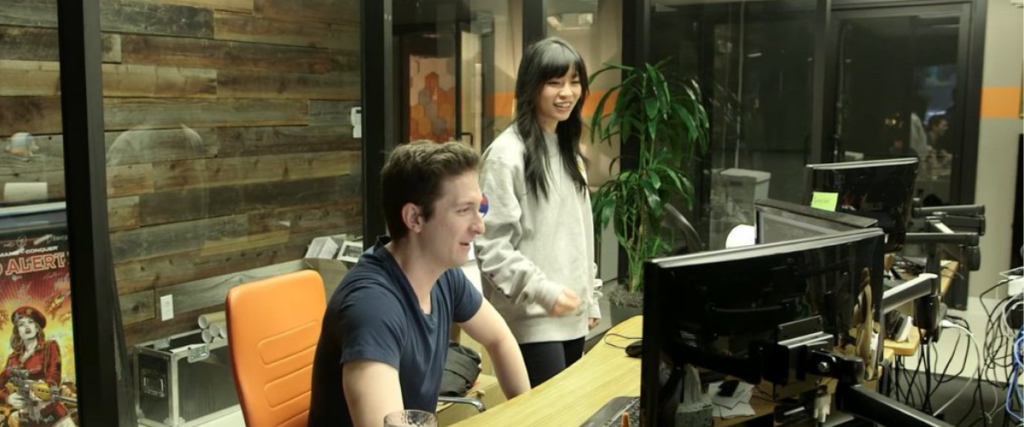Crunch culture runs rampant in Japan and the US, the two game development centres of the world. Could a new wave of indie studios bring about a crunch-free future for the industry?
In recent years, crunch culture has become ubiquitous in conversations about video game development. Following every triple A title release from a major game development studio, almost without fail, emblazoned on headlines are the words “crunch culture”, the phenomenon whereby employees work 60-hour weeks in order to complete a game in time for release. The practice is so normalised within the community that it is accepted as a mere aspect of game development, which has caused companies like Rockstar to push employees to work sixty-hour weeks, and CD Projekt Red to renege on their commitment to “be known for treating developers with respect.”
The practice of crunch has a long history, perpetuated by the perception that it is a necessary evil in the grand scheme of a major launch, or by the eagerness and passion of developers that nullifies concerns about their own mental and physical health. In light of this, independent game development studios have been trying to implement strategies and policies designed to focus on labour rights and employees’ well-being.
The Trailblazers
Los Angeles-based creative studio Crispy Creative is one of the companies taking a more employee-centric approach to game development. “Indie developers are normally the trailblazers, showing what can be done and what should be done,” says Kylan Coats, co-founder and sole full-time employee alongside eight contract workers at Crispy Creative. Hades developer Supergiant Games is another company that has adopted an approach to development that values employees’ health. In a Kotaku interview, designer Greg Kasavin said that the studio behind the DICE 2021 Game Of The Year title prioritises developers by creating and adjusting policies. For instance, Supergiant implemented a mandatory days off policy, and prohibited sending work emails after 5p.m. on Fridays. Collective bargaining is also on the rise, with workforce unionisation and nonstandard workplace models such as worker-owned co-ops springing up in the game development space in recent years.

Cultural Differences
One might argue that the extent of crunch is dependent on the socioeconomic conditions underpinning the industry. For instance, the Malta-based studio 4A Games is entirely free of mandatory crunch. “It’s kind of hard to live on an island like Malta and not have a good sense of work-life balance,” says Jon Bloch, executive producer on Metro Exodus. Any extra hours are personal choices to improve their work, motivated by their own desire to ensure shaders and shadows look just right. Next to American game development studios, the country most well known for its games is Japan, the country infamous for its working culture systemically rooted in hierarchical preconceptions of work. Crunch culture is widespread, and even internalised by workers all over Japan. Companies may technically allow their employees to take days off if needed, but rarely, if ever, do employees make use of these benefits, whether it is because of cultural pressure or the actual workload given to employees.
That said, by no means does it go unrecognised. Developers respond to inquiries about crunch culture with rueful laughs belying a tacit understanding that overwork is so normalised in Japanese culture that the possibility of improved working conditions is barely entertained. The same issue is also pervasive across industries, particularly in the anime industry. Employers take advantage of the fact that, to freelancers fresh out of school, anime is a labour of love. This results in animation studios, like development studios, underpaying and overworking their employees.

Shifting Preconceptions
Thankfully, Mega Man composer Manami Matsumae notes that these preconceptions are beginning to shift. When asked at Games Connect Asia Pacific about Japanese working culture in the games industry, Matsumae posits that Japanese workers in the modern day have become less attuned to the normalised culture of overwork. “People are less likely to be so devoted to their jobs, in terms of labour or hours worked. People are starting to change in that regard,” said the composer. Matsumae also points out that the emergence of indie studios is one of the major factors contributing to Japan’s shifting attitudes towards crunch culture in game development.
The indie scene is far less visible in Japan than in the West, though. Matsumae’s translator Alex Aniel notes that the main reason why average indie studios in Japan struggle to commercialise their games is funding. Aniel cites Nigoro’s 2D platformer La Mulana as an example of a game whose launch was made successful through monetary support from angel investors based in the US. In 2014, the studio made it clear through a Kickstarter campaign that they wanted fans, instead of investors, to support the launch of the sequel to their game, reflecting a desire to adopt a co-operative ethic going forward.
Japan’s Indie Revolution
Key to this shift in attitudes is BitSummit, Japan’s industry-leading independent game development festival. Every year, independent game developers flock to Kyoto to rub shoulders with like-minded creators and try their hand at the diverse collection of indie games on display. Most importantly, panel discussions and keynote presentations allow young, burgeoning creators to get advice from veterans in game development. The festival is designed and structured in a way that allows equal access across the board. Young developers can easily show off their games to industry heavyweights at neighbouring booths without any special passes, and studios can network with representatives from game distribution platforms such as Steam.

Indie game incubator Asobu is also pushing for the independent development scene to become more visible. “What’s been happening in the West is an indie game revolution,” says Asobu co-founder Mark MacDonald. In the US, more developers are rallying behind indie studios, but Japan has been slow to catch on, he adds. The incubator’s headquarters in Shibuya has offices that indie developers can use. More importantly, the space hosts game jams, play-testing sessions, among other regular events allowing developers from different backgrounds to bounce ideas off each other and build a sense of community and belonging in the Japanese indie scene. What’s more, developers can become Asobu members free of charge, thanks to the incubator’s partnerships with Microsoft, Kickstarter, and book publisher Kodansha.

An indie game revolution seems antithetical to the social fabric of Japan, and yet, BitSummit and Asobu, along with the many young, independent creators across the country, are continuing to forge a future for a community that will shift Japan’s cutthroat working culture towards a model that values employees’ rights and well being.
Featured banner image credit: @supergiantgames
Related Articles
What APAC Can Learn From Iceland’s Four-Day Work Week
5 Key Trends Redefining the Future of Gaming
10 Business Lessons We Can Take From Fortnite’s Colossal Success





